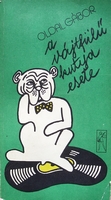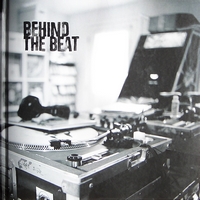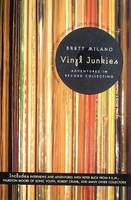

Hevenyészett bakelitográfia



Szépirodalom
Hornby, Nick (1996/2003) Pop, csajok, Satöbbi, Budapest,: Európa Kiadó.
Népszerű ismeretterjesztés
Eisenberg, Ewan (1987) The Recording Angel. Music, Records and Culture from Aristotle to Zappa. London: Picador.
Juno, Andrea és Vale, V. (1993): Incredibly Strange Music. Volume I, San Francisco: Re/search.
Milano, Brett (2003) Vinyl Junkies. Adventures in Record Collecting, New York: St. Martin’s Griffin.
Oldal Gábor (1962) Hanglemezbarátok kézikönyve, Budapest: Zeneműkiadó.
Oldal Gábor (1975) A vájtfülű kutya esete. Budapest: Zeneműkiadó.
Technika- és lemezipartörténet
Copeland, Peter (1991) Sound Recordings. London: The British Library.
Gronow, Pekka és Saunio, Ilpo (1999): An International History of the Recording Industry, London és New York: Cassel.
Keightly, Keir (2004) „Long Play: Adult-Oriented Popular Music and the Temporal Logics of the Post-War Sound Recording Industry in the USA.” In Media, Culture and Society, Vol. 26. No.3. pp. 375-391.
Sanjek, Russel és Sanjek, David (1991) American Popular Music Business in the 20th Century, New York : Oxford University Press.
Straw, Will (2002/2005) „Érték és sebesség: az óriás kislemez mint médium és műtárgy” in Replika No.49. pp.103-117. Elérhető az interneten: http://www.replika.hu/49/49-06.pdf
Társadalomtudományi megközelítések
Dougan, John (2006) „Objects of Desire: Constructing Canons in Blues Record Collecting”, in Journal of Popular Music Studies, 2006 Spring, pp. 40-65.
Hayes, David (2006) „“Take Those Old Records off the Shelf”: Youth and Music Consumption in the Postmodern Age”, in Popular Music & Society, Vol. 29, No 1. p. 51-68.
Jamison, Mark (1999) „The Place of Counterfeits in Regimes of Value: An Anthropological Approach.” In Journal of the Royal Anthropological Institute, Vol 5. No. 1. pp.1-11.
Straw, Will (1997) „Organized Disorder': The Changing Space of the Record Shop.” In Steve Redhead, Derek Wynne and Justin O'Connor (eds.) The Clubcultures Reader: Readings in Popular Cultural Studies. Oxford: Blackwell Publishers Ltd., 1997. pp. 57-65.
Straw, Will (1997) „Sizing Up Record Collections: Gender and Connoisseurship in Rock Music Culture.” In Sheila Whiteley (ed.) Sexing the Groove: Popular Music and Gender. London: Routledge,1997, pp. 3-16.
Straw, Will (1998) „The ‘Thingness’ of Things: Music and Material Culture” Előadás az "Interrogating Subcultures," konferncián, University of Rochester, Rochester, 1998. március 27-én. In in []visible culture Vol.2. Elérhető az interneten: http://www.rochester.edu/in_visible_culture/issue2/straw.htm
Straw, Will (1999) „Exhausted Commodities: The Material Culture of Music”, in Canadian Journal of Communication, Vol. 25, No. 1. Elérhető az interneten: http://www.cjc-online.ca/viewarticle.php?id=571&layout=html
DJ kultúra
Allen, Joe (1999) ‘Backspinning Signifying’ in to.the.quick, issue 2. Available on the internet: http://to-the-quick.binghamton.edu/issue%202/sampling.html.
Bradley, Lloyd (2000) Bass Culture. When Reggae Was King, London: Pinguin.
Chang, Jeff (2005) Can’t stop, won’t stop. A history of the hip hop generation, New York: St. Martin's Press.
Farrugia, Rebekah és Swiss Thomas (2005) „Tracking the DJs: Vinyl Records, Work, and the Debate over New Technologies”, in Journal of Popular Music Studies, Vol.17. No.1. p.20-44.
Fricke, Jim és Ahearn, Charlie (2002) Yes yes y’all. Th Experience Music Project Oral History of Hip Hop’s First Decade. Cambridge, MA: Da Capo Press.
Hesmondhalgh, David (1998) ‘The British Dance Music Industry: A Case Study of Independent Cultural Production’ in British Journal of Sociology, Vol. 49 No. 2. p. 234–251.
Lawrence, Tim (2003) Love saves the day. A history of American dance music culture 1970-1979, Durham and London: Duke University Press.
Poschardt, Ulf (1995) DJ Culture, London: Quartet.
Rose, Tricia (1994) Black Noise. Rap Music and Black Culture in Contemporary America, Hannover and London: Wesleyan University Press.
Straw, Will (2002) ‘Value and velocity: the 12-inch single as a medium and artifact’ in Hesmondhalgh, David and Negus, Keith (eds.) Popular Music Studies, London: Arnold, p. 164–177. [A replika 49-ben benne van magyarul]
Thornton, Sarah (1996) Club Cultures – Music, Media and Subcultural Capital. Hanover & London: Wesleyan University Press, Published by University Press of New England.
Toop, David (2000) Rap Attack #3, London: Serpents Tail.
Lemezesztétika
Adorno, Theodor W. (1927/1991) „The Curves of the Needle”, in: October, No. 55., p. 48-55.
Adorno, Theodor W. (1934/1991) „The Form of the Phonograph Record”, in: October, No. 55., p. 56-61.
Adorno, Theodor W. (1938/1969) „Fétiskarakter a zenében és a zenei hallás regressziója”, in: Zene, filozófia, társadalom. Budapest: Gondolat, 1969, p. 227-274. Elérhető az interneten:
http://frankfurt.tek.bke.hu/media/szoveg/adorno_fetisjelleg.htm
Adorno, Theodor W. (1969/1991) „Opera and the Long-Playing Record”, in: October, No. 55., p. 62-66.
Levin, Thomas Y. (1991) „For the Record: Adorno on Music in the Age of Its Technological Reproducibility”, in: October, No. 55, p. 23-47.
Fotók
Raph (2005) Behind the beat. Hip Hop Home Studios, Corte Madera, CA: Ginko Press.
Képzőművészet
Lee, David Choong (2002) God Made Dirt...And Dirt Don't Hurt, Corte Madera, CA: Ginko Press..
Animációs film
The Record Store (2004) Rendező: Daniel Kannegiesser.
Játékfilm
Pop, csajok, satöbbi [High Fidelity] (1999), DVD, UK/USA: Buena Vista. Rendező: Stephen Frears.
Dokumentum-film
Deep Crates (2004), DVD, Canada: Beatdawg Films. Rendező: Beatdawg.
Scratch (2001), DVD, USA: Palm Pictures. Rendező: Doug Pray.
So Wrong They’re Right (1993/1999), DVD, USA: Other Cinema. Rendező: Russ Forster.
Vinyl (2000/2002), VHS, Canada: The Asylum. Rendező: Alan Zweig.